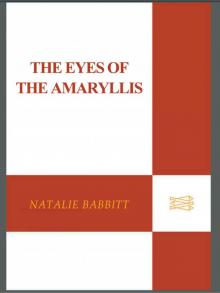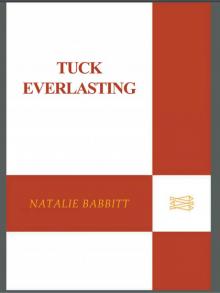- Home
- Natalie Babbitt
The Moon Over High Street Page 5
The Moon Over High Street Read online
Page 5
Of course he wanted it! And all the extras. A very fine thing to wake up to. They took their time with eating, and then, just as twilight was dropping down through the trees and they had started to discuss the serious question of dessert, the telephone rang. Aunt Myra answered it, and after a short conversation, she said to the caller, “I’ll see what he thinks and get right back to you.” She hung up the receiver and turned to Joe. “That was Amanda Sope—Beatrice’s mother, remember?” she told him. “Rover got out of his yard again. She says he probably went across the park to where a poodle lives that he likes to visit. Gil usually hikes over there to bring him back—it isn’t very far—but he and Vinnie had to go downtown to fix some kind of electrical problem at a restaurant, and Evangeline and Dorothea both have a bunch of mosquito bites and aren’t very happy, so she doesn’t want to leave them. But someone has to go. It’s against the law for dogs to be in the park without their owners. So Beatrice will have to do it. But Mrs. Sope doesn’t want her to go alone, now that it’s getting dark. She says she hates to ask, but she’d feel a lot better if you went along. How about it?”
“Sure. That’d be okay,” said Joe. Okay? Yes. It would be okay.
“IT’S REALLY NICE of you to do this,” said Beatrice to Joe, winding Rover’s empty leash around her hand as they started off down Glen Lane. “Mom always worries when one of us has to do stuff alone. But Rover goes across the park all the time, every chance he gets, and somebody always has to bring him back. It’s like he’s got a crush on that poodle over there, always trying to sneak out to see her the way he does.”
“Does she get out, too?” Joe asked. “I mean, are they—like—friends?”
“Nope,” said Beatrice. “Her yard’s got a high metal fence. The people that own her—Mr. and Mrs. Macarthur—would never in the world let her out to play with a mutt like Rover. You have to have a pedigree before you’re allowed to play with Tulip. That’s her name. Tulip. Every time they see Rover over there, they call us up and tell us to come right away and get our ah-nimal, just like they were living up on High Street.”
“Mr. Boulderwall called him that, too,” said Joe. “Except, well, not ah-nimal, maybe …”
“No,” she answered, “he wasn’t stuck up about it. But Rover is an animal. So is Tulip. Us, too, if it comes to that. Hey, didn’t you go to the Boulderwalls’ yesterday? What was it like?”
“Oh—well,” said Joe, “it was okay, I guess. We went inside the house, and it was pretty incredible—full of all kinds of fancy stuff—but if I lived there, I’d feel like I had to change my socks every five minutes and keep my gloves on. I’d go nuts in a house like that. I mostly talked to Mr. Boulderwall, though—in a separate room he called his study. He asked a lot of questions.”
“Like what?” she wanted to know.
He hesitated—and then found that the closed door inside his head was opening at last. He wanted to tell her. It was time. And so: “He asked me what I was going to do when I get out of college,” he began. “He asked me how I want to spend my life.”
“That’s a pretty hard question,” she said with a frown. “At least, it would be for me. I’d have too many different answers! So—but, what did you tell him? Do you know what you want?”
They had reached the farthest edge of the park. There were fewer trees here, and a green-painted bench set near the street was empty, now that the day was over. Joe sat down on the edge of it and looked up, above the rooftops and the interfering streetlights, to where a glow behind a serving of clouds gave away the secret that the moon was there, waiting for its own time onstage. Joe resisted the impulse to beckon to it. Instead, he took a deep breath and said to Beatrice, “I do know what I want. I guess I’ve known ever since I was little. I want to be a scientist, and try to find a way to make sure nothing bad ever happens to change the moon. I want it to stay the same. And never ever go away.”
Beatrice sat down beside him, her hands clasped under her chin. “Wow!” she said. “That sounds really good!”
“I didn’t tell Mr. Boulderwall about it, though,” he said, and then added, swallowing hard, “I’ve never told anyone before.”
“Of course not!” she exclaimed. “It’s nobody’s business but yours. Not yet, anyway. But thank you for telling me.” And then, “Joe,” she added, “what do you think might happen? To the moon, I mean.”
Joe leaned back on the bench, his hands in his pockets. It felt so fine to talk, at last, about all this! “Bad stuff’s been going on up there since the beginning,” he told her. “I’ve read about it a lot. The moon’s really old—something like four and a half billion years old—you probably knew that already—and asteroids and comets and things’ve been smashing into it all that time. So it’s got craters on it everywhere. But, look—I don’t suppose it’ll ever exactly go away. I mean, there’s nowhere for it to go to! Still, it’d be good if it could be protected—if there was some way to make things go past it instead of into it. They’re always talking about trying to do that for Earth, but we should do it for the moon, too. And I want to be in on that. Finding out how to protect it.”
As he was saying this, the clouds were dissolving, and the moon, its moment come, revealed itself at last. It had begun its slow monthly waning already, but still, it seemed enormous, so low in the sky, and shapeless shadowy patches gave its face a surface that looked carelessly dabbed at here and there by a soft brush full of soft gray paint.
Beatrice said, “What makes those dark spots?”
“Some of them are mountains,” he told her, “but mostly, they’re sort of scooped-out places made by the stuff that crashes there. They’re called impact craters. Isn’t that a great name? Impact craters! So—that’s what I want to do when the time comes. Ten or fifteen years from now, or thereabouts. I don’t know why Mr. Boulderwall should care. But Aunt Myra said if there was anything on his mind, he’d probably let me know when he was ready.”
“He likes you,” said Beatrice. “Remember how I said he kept looking at you, the other day?” After a pause, she added, “I guess I should start making up my mind what I want to be. Oh, well, it can wait a little longer. First things first. Let’s go get Rover.” She stood, then, and pointed across the street. “That poodle, Tulip, lives right over there. In that big yellow house.” And then, suddenly, out from behind the big yellow house, Rover, all grins and wags, was bounding across the quiet street to greet them.
“It looks like he was expecting us,” said Joe.
“Maybe,” said Beatrice, “but my guess is Tulip told him to mind his manners and go back where he belongs.”
UP ON HIGH STREET, the Boulderwalls were getting ready for bed. They hadn’t talked much to each other all evening, but now Mr. Boulderwall, watching his wife as she brushed her hair, said to her, “Ruthetta, I have something to tell you. At the office this afternoon, I called and made an appointment to go over to the capital tomorrow and talk to an adoption lawyer.”
Mrs. Boulderwall put down her hairbrush and looked at his reflection in her dressing table mirror. “An adoption lawyer? Already?” she exclaimed. “You’re really serious about all this, aren’t you?”
“I really am,” he told her, “and it’s a huge relief. I’ve been worried about the factory for a long time, as you very well know, and now all at once that boy appears out of nowhere and everything falls into place. Yes. I’m convinced this is the way to go.”
“All right. I guess I’m not surprised,” she said. She turned around to face him. “The factory is your affair, after all, and you know best what to do with it. But my life is my affair, Anson. I’ve worked hard to get it right and I don’t want changes. So here’s how I see the situation. Use your influence and get that rinky-dink boy into a top eastern prep school starting this fall. Groton, maybe, or Exeter. Pomfret. Andover. One of those. He’ll hate it, but a good one will pull him into shape so he’ll be ready for the right university and the right life afterward. He’ll have to be here in the house now and then, I
suppose, when you’ve adopted him, but the less I have to do with him, the better. And this way, most of the time he’ll be off in New England. That should take care of things, and then, later on, when he’s heading up the factory, you can find a well-bred girl for him to marry who can show him how to deal with social situations. But I’m not going to be his teacher, Anson. As long as he doesn’t get in Ivy’s way, he’s nothing but hired help to me. A great big zero.”
“As you will, my dear,” said Mr. Boulderwall. “Consider it done.” And he climbed happily into his bed.
“There’s just one thing,” she said to him as she lifted the covers of her own bed gracefully and arranged herself under them. “Have you thought about what you’ll do if that boy doesn’t want any part of all this?”
Mr. Boulderwall chuckled as he settled into his pillows. “You mean, if he doesn’t want the best schools in the country and then an easy job that will make him a High Street millionaire? Somehow I just don’t see it turning out like that.”
“I suppose you’re right,” she said with a sigh. “That’s that, then. Have a good sleep.”
And he did have a good sleep—very good indeed.
VIII
THE NEXT FEW DAYS on Glen Lane—Tuesday, Wednesday, and Thursday—were typical lazy days of the kind that sometimes make up summer vacations. Nothing to rush around for, no reason to do much but yawn and read and use up the ice cream and popcorn, and on Wednesday—this particular Wednesday for Joe, at any rate—go across the street to help Beatrice take Evangeline and Dorothea down to the park to do seesaws and swings. “If you were back home,” said Beatrice to Joe with a sigh, “you’d probably be going swimming in Lake Erie, wouldn’t you, or playing baseball or something, instead of helping out with all this babysitting,” which of course brought on an explosive protest from Dorothea, who said flat out that, thank you very much, she was not a baby like Evangeline, which of course made Evangeline heave a handy—and muddy—clump of dandelion roots at Dorothea. Just typical lazy days.
There were telephone conversations with Gran, too, who was finally finishing her therapy—was, she insisted, hardly limping at all—and would be going home Friday for a week or two of practice with her canes and her walker before her trip down to Midville. And Joe, who was as eager now to stay in Midville as he’d been before to stay in Willowick, was telling her he was fine. She should take her time, there wasn’t any hurry.
AND ALL THE WHILE, through these three lazy days, there was something enormous headed toward them. Something huge. A meteor, a comet, an asteroid—some kind of sky rock, anyway. Not a real sky rock, of course—the post office doesn’t send out sky rocks—but that’s what it might as well have been. Up on High Street, the Boulderwalls knew it was on its way and were waiting to see what kind of crater it would make when it hit. But down on Glen Lane, and up north in Willowick, there wasn’t the slightest hint of anything. “No announcement aheada time,” as Vinnie would have said. “No fuss and feathers, nuthin’—because ya don’t see or hear them sky rocks comin’ at ya.” There would only be, all at once, a sudden total astonishment, an arrival out of nowhere—BAM!—and no sweet old horse to take the impact.
The sky rock came into sight when the telephone rang early Friday morning. It was Gran, her voice rushed, puzzled, angry: “Myra? Is that you? What in the world’s going on down there?”
“Gran? What do you mean? What’s wrong?”
“What’s wrong? I’ll tell you what’s wrong! I just got a special delivery letter, and it’s the biggest shock I ever had—that’s what’s wrong! I simply can’t believe it! It has to be a joke, but—well, I needed to talk to you right away!”
“Slow down, Gran. What letter? What’re you talking about?”
“I thought maybe you could tell me,” she declared. “This man, Anson Boulderwall—who does he think he is, for pity’s sake? Oh, I know the name, of course. Who doesn’t? He’s always on those lists they put in the paper about the richest men in the state. But so what? Just because he’s rich, that doesn’t give him the right to mess with Joe like this.”
“You got a letter from Mr. Boulderwall? About Joe?”
“No, the letter’s from some high-and-mighty lawyer in Columbus. But it was Mr. Boulderwall that got him to write it, and it certainly is about Joe!”
“You’d better read it to me, Gran,” said Myra. “Now. Every word.”
“Yes,” she agreed. “Good. Here goes.”
FORSYTHE, WAMBAUGH & LOEB
1800 OPHAMORE AVENUE, SUITE 1228
COLUMBUS, OHIO
JUNE 17, 1965
Mrs. Roberta Casimir
1943 Lake Shore Boulevard
Willowick, Ohio
Dear Mrs. Casimir:
Our firm has been selected to represent Mr. Anson Boulderwall of Midville, Ohio, in a matter which concerns the future of your grandson, Joseph Casimir, currently residing in Midville with Miss Myra Casimir.
Mr. Boulderwall is a man of substantial means who is held in high esteem by all who know him. He is the President and owner of Swervit, Inc., as well as a loving husband and father. I relate these facts preliminary to informing you that Mr. Boulderwall, having recently made the acquaintance of your grandson, has determined, on the basis of his judgment of Joseph, to underwrite the boy’s future education and training with an end to placing him, at the proper time, in a position of leadership at Swervit, Inc. This is, as I believe you will agree, an extraordinary undertaking on Mr. Boulderwall’s part. I can assure you that he has the means to fulfill it completely on the boy’s behalf.
In order to make this plan most effective, we have advised Mr. Boulderwall that adoption papers should be drawn up at the earliest opportunity, and he agrees. According to the public record, you are the named guardian of Joseph, having been so designated following the demise of both his parents in August of 1953. Therefore I write to request a meeting with you at your earliest convenience so that I may fully disclose the details and size of Mr. Boulderwall’s generosity and can arrange for the necessary legal action to place the plan fully into effect.
I would be happy to call on you at a time of your choosing to discuss any aspect of this proposal.
Sincerely yours,
J. Converse Forsythe, Esq.
cc: Anson Boulderwall
“There! See? What do you make of that?” Gran exclaimed.
After a moment, Myra said softly, “I didn’t know about any of this. Good grief.”
“My dear,” said Gran, “there’s nothing good about grief, as you and I have reason to know. Look—I’m going to pull things together and come down to you tomorrow. You were expecting both of us anyway, Joe and me, weren’t you?”
“Yes, of course I was,” said Myra, “but—I mean—can you manage it? What do your doctors say?”
“My doctors?” Gran snorted. “I’m not going to discuss this with my doctors! I’m coming down to Midville tomorrow, no matter what, and that’s the beginning and the end of it.”
“Oh dear,” said Myra. “But—Gran—how are you feeling? A long bus ride won’t be much fun for that hip of yours, even if it is the most direct way to get here.”
“No bus,” said Gran. “I had plans from the beginning to come in a car. I’ll just set it up for tomorrow instead of sometime in a week or two. There’s a woman up here—Helen Mello, a widow like me—you met her one of those times you came visiting, I think. She’s a silly old twit, but I love her dearly—we’ve been friends for years—and she’s got a son near you, over in Oxford. She told me, when she came to see me in the hospital, that she’d drive me down to your house whenever I was ready, then go see him and his family for a couple of days and, after that, bring Joe and me back up home together. She said Oxford’s practically next door to Midville.”
“True enough,” said Myra. “All right—come ahead. We certainly need to talk, and the sooner the better. But, Gran, shall I tell Joe what’s going on? Or should I wait till you and I can tell him together?”
“Mmmm,” said Gran, mulling it over. And then: “You’ll have to tell him I’m coming, anyway, so I guess you’d better tell him why. I’ll give you a call tomorrow afternoon from somewhere on the road when we get close. Goodbye for now. I’m going to go set things up with Helen and then start getting ready.”
“All right,” said Myra. “Thanks, Gran. See you soon.”
BREAKFAST WAS READY on the table when Joe appeared, tousled and smiling. Myra found herself looking at him in a new way: Joseph Casimir Boulderwall? Maybe there was such a thing as good grief after all! But she put the notion firmly aside and said to him, “Hey there—you’re up! Gran called a little while ago. Did the phone wake you? She’s feeling a lot better, and she’s coming tomorrow for her visit. She said a friend of hers—Mrs. Mello—is going to give her a ride.”
Joe’s smile disappeared. He sat down at his place and picked up his glass of orange juice. “Oh. Yeah. Mrs. Mello. I stayed with her when Gran went to the hospital.” He looked off to one side and asked, carefully, “Will she be here for the visit, too? Mrs. Mello?”
“No, she’ll be staying with her son over in Oxford,” said Aunt Myra. “But she’s planning to drive you and Gran back home a few days later.”
“That’s all right, then,” said Joe, and his smile returned—but only briefly. “Hey, wait a minute! How come Gran wants to come down now?” he said. “I thought we still had a few weeks to go!”
“Well …” Aunt Myra reached across the table and took his hand, and her voice carried with it the faintest of trembles. “The thing is, Joe, something’s happened. Something none of us could ever have expected. Joe, Gran got a letter this morning, and she’s really upset. It’s Mr. Boulderwall. He wants to—well, he’s hired a lawyer, and he’s got a plan all made to—to—oh, Joe, dear Joe, he wants to adopt you!”
BAM.

 The Eyes of the Amaryllis
The Eyes of the Amaryllis Herbert Rowbarge
Herbert Rowbarge The Search for Delicious
The Search for Delicious Kneeknock Rise
Kneeknock Rise Goody Hall
Goody Hall Tuck Everlasting
Tuck Everlasting The Devil's Storybook
The Devil's Storybook The Moon Over High Street
The Moon Over High Street Phoebe's Revolt
Phoebe's Revolt Barking with the Big Dogs
Barking with the Big Dogs The Devil's Storybooks
The Devil's Storybooks